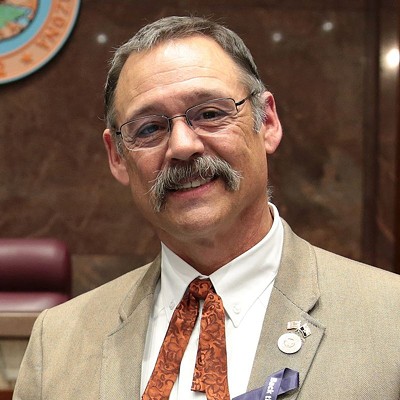Yet county officials are fighting a bill in the Legislature that would provide $3 million to pave the dusty and rutted Santa Rita Road, a project that would benefit a French mining company and up to 19 families who live along the road north of Sahuarita.
Legislators are stunned that the county would reject such largesse. County officials are stunned that legislators would stick their noses into local matters. And those who want 12 miles of Santa Rita Road made smooth for the rumbling trucks carrying loads of calcium carbonate are stunned that the money may evaporate.
This chapter of government relations began in June, with a letter that expressed pleas for the county to do something about the Santa Rita Road, its washboard conditions and the dust kicked up by the heavy trucks pounding their way to and from the Imerys Marble Inc. mine.
Meetings broke out, and Imerys, based in Paris, dispatched John Kaites, a former legislator and failed candidate for state attorney general, to whip up support for an upgrade of Santa Rita Road.
Along the way, Santa Rita Road paving has been portrayed as a safety issue, a health issue, an economic development issue and flat pork-barrel politics. County officials view it as none of the above.
On the latter issue of politics, few realized who, on the Board of Supervisors, represented the area. Long part of rural portions of neighboring districts, the area was inserted into District 2, the formerly urban ward that has been represented by Democrat Ramon Valadez since he succeeded his political patron Dan Eckstrom last year.
But Valadez has shunned this pork.
He has adhered to advice from County Administrator Chuck Huckelberry, who told Valadez in August that Santa Rita Road didn't meet road-improvement criteria and that the county lacked sufficient money for a paving project there.
"This request is unusual in that the roadway provides primary access to a single business and has always been a dirt road maintained on an infrequent schedule," Huckelberry told Valadez in an August memo.
Huckelberry reminded Valadez of the historic difficulty in keeping up with paving and dust control on the county's "several thousand miles" of dirt roads and said the county lacked money to fix the rough, dry-weather-only crossings Santa Rita Road makes through several washes.
"I certainly understand this is not the answer that the owner wants to hear," Huckelberry said, while noting the state's raid of a portion of gas-tax revenues due to the county for roads in the last two years. "The county has no funds available for paving or improving of Santa Rita Road."
Nine miles of the road is public; the final three miles are controlled by Imerys, which officially uses the address, "End of Santa Rita Road, Sahuarita."
Trucks haul 24 hours a day. Kaites told county officials that one truck overturned on a dangerous curve two years ago, killing the driver. Kids waiting for school buses, Kaites said, "are dusted" as those trucks rumble by.
County transportation officials counter that there are other, more dangerous roads used by more people that require county attention and money. And officials from the county Department of Environmental Quality oppose funding for Santa Rita Road, saying there are other dirt roads serving greater populations that need relief. County officials also fret that the county could be on the hook for $3 million to $6 million--out of county coffers, above the Legislature's allocation--to properly fix a road for which no engineering studies have been done. State legislation mandates that the $3 million be spent within a year.
The mine, on government property, is the only calcium carbonate mine in Southern Arizona. County records show that Imerys paid just $51,257 in property taxes last year. By comparison, Portland Cement, in Marana, paid $2.8 million. Still, Imerys' mine is regarded as a producer of high-quality material for dry wall and swimming pool finish.
Only 15 people work at the mine, but the Tucson Metropolitan Chamber of Commerce, a supporter of legislation, contends that the mine has a "ripple effect" of 400 more jobs.
With the county balking, Kaites, the lobbyist, looked to what is familiar--the Legislature. He quickly orchestrated community demand that hooked the area's senator, Tim Bee, and two representatives, Marian McClure and Jonathan Paton. All three are Republicans.
They sponsored a bill to direct $3 million from a state air-quality fund to Santa Rita Road paving.
"The Arizona Department of Environmental Quality is against it, yet clearly we have clouds of dust coming off this road," McClure said this week. "If we can eliminate any pollution, isn't that a good thing?"
Paton, a freshman, said he ran on the principle of grabbing every dime of taxpayer money that flows from Pima County to the state. He said he sees this as an opportunity, particularly because the air-quality fund will be tapped anyway.
"It's money for my district," Paton said. "It seemed like a good thing to do for my constituents."
County opposition "didn't make any sense to me," said Paton, a former lobbyist for the Southern Arizona Home Builders Association. "I've never seen Pima County turn down money before."
It seemed so reasonable that the Republican sponsors were able to reel in state Rep. Tom Prezelski, a Tucson Democrat. But Valadez outranks Prezelski, who gained his seat initially through appointment. And after quick trip to the woodshed, Prezelski flipped. He now says the Legislature shouldn't butt into county business.
"That was a mistake," Prezelski said this week. "I looked at it from the perspective of my former job with the Tohono O'odham Nation, where we would try to look for all funding sources."
The measure cleared the House Environment Committee on Feb. 2. Steve Huffman, an Oro Valley Republican, was one of three members voting against it. The bill now is headed to the House Appropriations Committee.
The hearing before the Environment Committee pitted county officials against those who live along portions of Santa Rita Road.
Paton said he will push for more funding if it is needed, adding that sentiment from constituents cannot be discounted.
"It takes a lot," Paton said, "for people to be upset enough to drive up to Phoenix for a legislative hearing."












